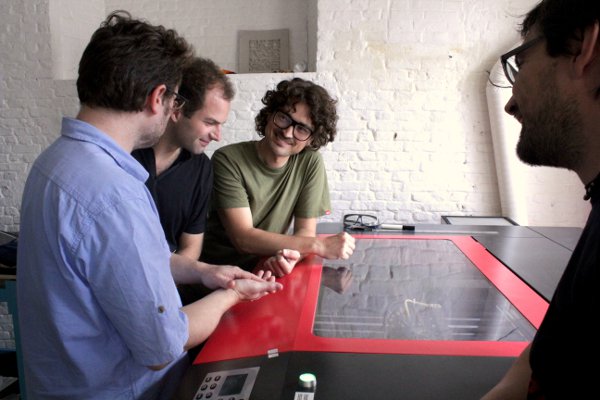FabLab.iMAL : Practical info
Workshops
Training workshops are necessary (and mandatory) before using any machine of the FabLab: lasercutter, 3d printers and CNC milling machine. A short introductory workshop of 4 hours will introduce the participants to the basics and the safety instructions.
Theis workshop is open to everybody (you don't need to be a member) and is a good way to discover the FabLab!
These workshops are taught in French, but you can always ask questions in English.
Price: 40€
Check our agenda for the dates of our next workshops and register here (beware, this page uses the month/day US date format).
FabLab.iMAL organizes other improvement workshops and advanced masterclasses. Please check iMAL agenda.

During this workshop, you will discover...
Lasercutting
Thanks to a powerful yet precise laser, the lasercutter cuts and engraves quickly materials like wood, plexiglas, cardboard, … The lasercutter only works in 2D and can either follow vector paths (as you can draw in Illustrator, etc) or engrave black&white bitmap pictures.
This workshop is an introduction to the software driving the machine, the different file formats and conversions, and will explore softwares allowing to creating 3D objects by assembling cut parts.
3D printing
A 3D printer, unlike the lasercutter, adds materials instead of removing it. The processus is very simple, somewhere between the working of an inkjet printer and the principle of a pastry bag. The 3D model to print is converted into a series of very thin layers that the printer will lay one by one, on top of each other. The “ink” in this case is a very thin thread of fused plastic that comes out of the printer head.
This workshop will introduce the participants to the various 3D printers of our FabLab, their related softwares, the file formats and quickly explores a few 3D modeling softwares.
CNC milling
The CNC (computer numerical control) milling machine allows to machine solid materials. The main difference with the laser cutter is that it allows to work in 3D, for example to sculpt wood from a 3D model. The milling machine also excels in 2D, and allows for example to engrave your own circuit boards.
This workshop will introduce the participants to the principles of machining, the tools, and softwares to drive the machine and generate 2D and 3D toolpaths.
[+]
FabLab iMAL
Een archief : 1999-2010-2019
Deze pagina is een archief van de iMAL website zoals die tussen 2010 en 2019 bestond. Alle activiteiten en projecten die sinds het begin in 1999 door iMAL georganiseerd zijn zijn hier gearchiveerd.
Het meest recente nieuws en activiteiten kan je terug vinden op onze nieuwe website: imal.org
